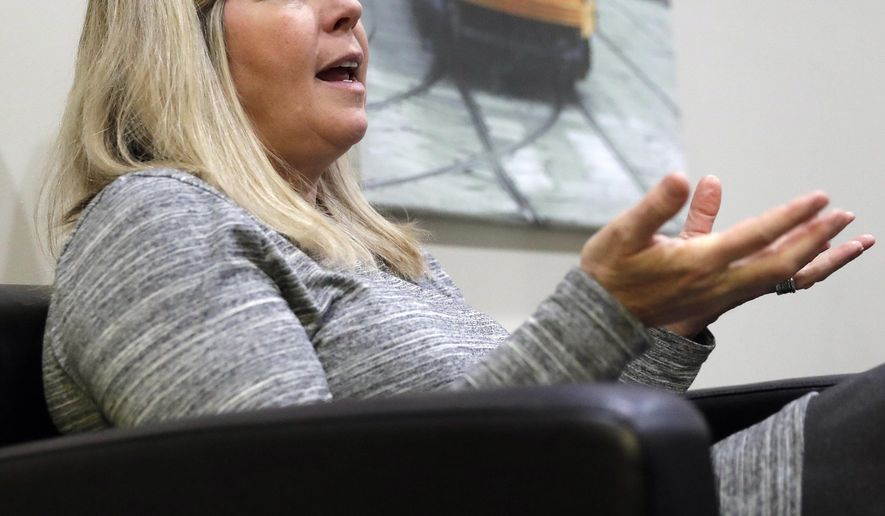CRANDON, Wis. (AP) - When Kristina Pence-Dunow’s marriage went south in 1997, she had two young children at home. To keep food on the table and a roof over their heads, she did what any other self-respecting single parent might do.
She built a $20 million a year manufacturing empire with 55 employees.
“It’s something that happened,” said Pence-Dunow, now 53. “I had no choice. I had to make it work.”
She made it work with trackless trolley buses: brightly-colored replicas of those cable cars that big cities used to depend on for public transportation two or three generations ago. It’s not exactly a commodity you’d think of to make your fortune, but Pence-Dunow’s factory is building a hundred of them every year and shipping them all over the world.
Hometown Trolley builds trolleys for limousine companies, tour group companies and municipalities wanting to liven up things for their downtown commuters throughout the U.S., Canada and South America. They’ve recently received inquiries from Dubai, the Netherlands, Australia and South Korea, the USA Today Network-Wisconsin reported.
All of this comes from a city of less than 2,000 people, in the middle of the Chequamegon-Nicolet National Forest in northern Wisconsin.
Hometown Trolley also recently started building regular, boring old buses, just in case the popularity of their trolleys ever lulls, which seems unlikely.
Pence-Dunow didn’t start from scratch. The company, a sideline to her then-husband’s off-road racing business, was producing about a dozen trolleys a year for a single customer, Jody Perez and his company, Trolley Enterprises, in Florida in 1997 when she and Kevin Pence divorced. Pence-Dunow borrowed money from practically everyone she knew to come up with the $500,000 to buy just the trolley portion of the operation.
She renamed it Hometown Trolley and built a network of distributors around the country. Soon she was putting out 30 trolleys a year, good for $100,000 apiece or more depending on the size and options.
In 2004, when she landed her first major contract - 16 trolleys for Chicago’s Navy Pier district - things really took off. She bulled her way through the complexity of writing up a bid and learned how to apply and qualify for several important federal certifications.
Becoming certified as a disadvantaged business allowed her to compete with manufacturers 10 times her size, for example. And making sure her trolleys were made with 65 percent American-made parts meant that municipalities could use federal grant money to buy her vehicles.
Through it all, she fought her way through a male-dominated field.
“Especially in the ‘90s, there were no women in transit, and there was no respect for them, especially in manufacturing,” Pence-Dunow recalled. “I was a woman, so I couldn’t possibly know what I was talking about.”
All that started changing in the last 10 years. As Hometown Trolley grew, so did overall professional respect for Pence-Dunow.
In 2016, she bought out her biggest competitor, the Supreme Corporation’s Classic American Trolley line. This year, she was named the Wisconsin’s Small Business Administration Person of the Year.
“That seems to have changed things, too,” she said.
With the help of her son, Dustin Pence, and her second husband, Joey Dunow, she began producing “low-floor” trolleys, which allow easier access for people using walkers and wheelchairs.
They also improved the assembly line, installing rails that allow the trolleys to move sideways through each station of the construction process. Pence, 31, who serves as the company’s chief operating officer and production manager, says the track system increased production by about 20 trolleys per year, from about 60 a year to about 80 a year. As the company added personnel, it continued to increase production and now puts out about 120 a year.
A single trolley takes about five weeks to build, including the paint-drying. That hasn’t changed through the years, but the improved assembly line process means several more vehicles are being worked on at once, and two or three are reaching the final stage each week.
As he conducts a tour of the work stations, Pence identifies each of the more than 20 trolleys under construction by their ultimate destinations: “This one’s going to Miami Beach; they probably have 50 already.This one is going to Juneau, Alaska . This one is going to Pigeon Forge, Tennessee; they probably have 30 in their downtown transit fleet ..This one is just going out, heading to Door County; he orders one or two a year.”
A.J. Frank, owner of Door County Trolley in Egg Harbor, Wisconsin, has been buying Hometown Trolley vehicles for the last 10 years for his tourism operation.
“They’ve serviced me well over the years, and they’re always on time,” Frank said.
He also thinks Hometown Trolley does a better job than its competitors at copying the old-style cable cars that his customers find so attractive.
“The others make them to look more like buses,” he said. Frank just bought two new ones this spring, bringing the number he owns to 10.
All this old-time style comes from a Crandon company that sprung from a single mom’s need to keep her young family going.
“It just started out as survival,” Pence-Dunow said. “It was just trying to keep the product going out so I could pay the bills and feed us.”




Please read our comment policy before commenting.